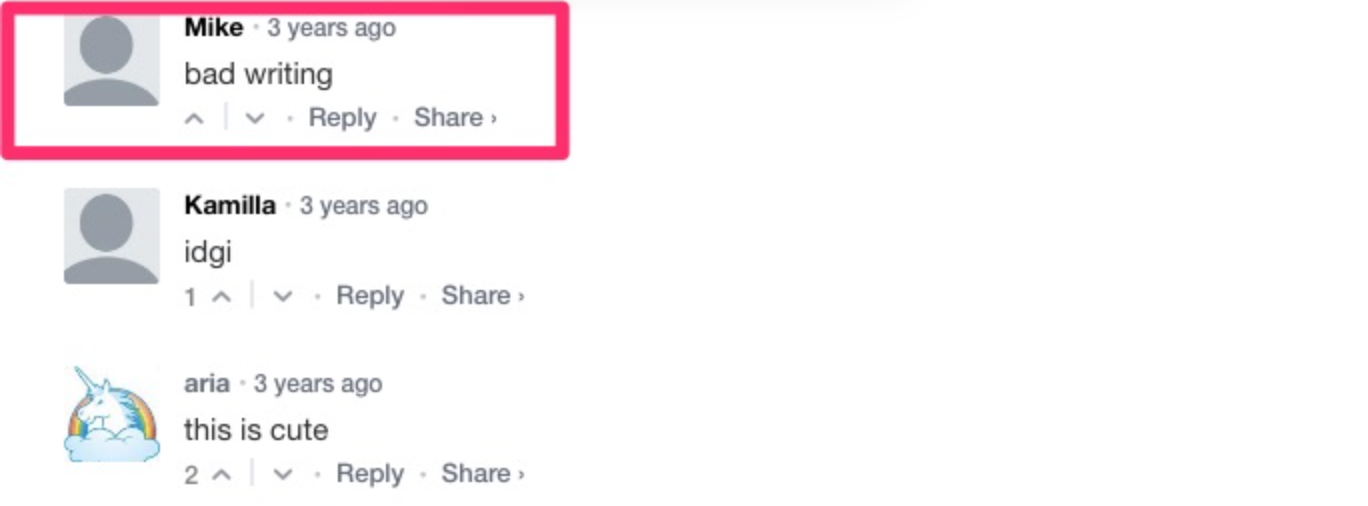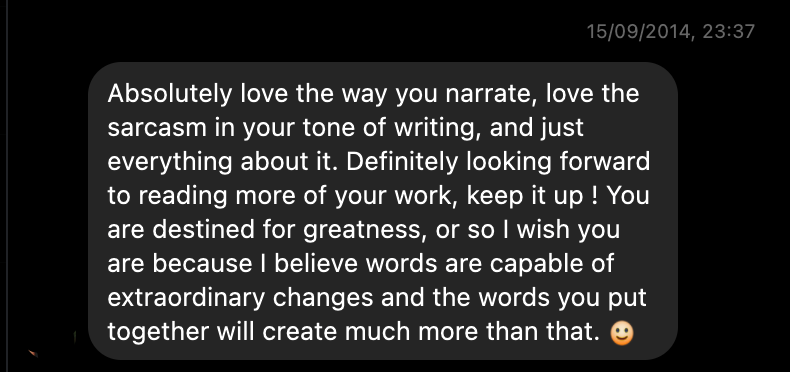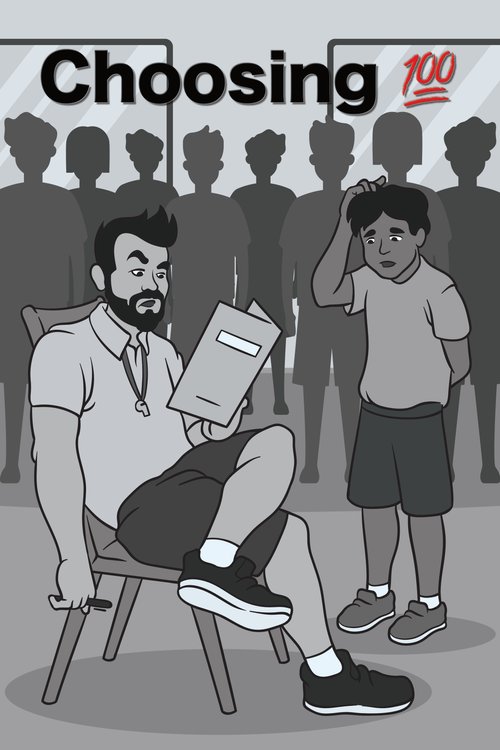I had this P.E teacher in high school who was a real hard-ass.
Let's call him Mr. M.
He was a strict man of few words, the type who would make you run laps around the school in the middle of winter if you were even two minutes late to his class.
He had a habit of giving his students cryptic "tests" meant to impart what he thought were important life lessons. Whenever he put you through one, you knew you learned something—you just weren't always sure what.
This is the story of one lesson in particular that has stuck with me my whole life.
It was 1st-period fitness class and I was in the 11th grade.
We were in the weight room doing what boys do in weight rooms (for me, that was cracking jokes instead of doing reps).
Without explaining why, Mr. M decided to call us up one at a time and ask us what grade we wanted to get in his class, taking note of each kid's answer.
"80...90...78...85...93..."
Each student would walk up, say his answer, and then rejoin the class. Mr. M simply nodded at each number before jotting it down in his usual stern silence.
Eventually, my name was called.
"What grade do you want in this class?" he asked, without looking up from his clipboard as I approached.
Before I continue, I have a confession:
I wasn't a model student in high school.
I got decent grades (usually), but I was also that kid who routinely skipped his 5th-period History class, never took notes, started studying the morning of all his tests, and coasted through Math on copied answers.
Just so you fully understand the seriousness of what I said.
"100?" I shrugged.
Mr. M put his pen down.
"Everyone. Come here for a minute," he said calmly, looking at me with a face I could never read. A circle formed.
I braced myself, expecting to get chewed out for being a smartass.
"This," he said slowly, gesturing to me.
"This is what everyone should aim for. Why would you only want 80 or 90 percent of anything in life? Braveen is the only one of you who said 100." He looked at me and nodded before dismissing us all.
Have you ever felt 25 people roll their eyes at you?
"F*** you, Braveen," one of my classmates whispered. He thought I was full of shit.
I was. I didn't care what grade I got in P. E.
In fact, I was pretty comfortable with mediocrity when it came it grades—70% is a glass more than half full by my standards back then.
But what I didn't realize was that this attitude would hold me back when it came to the one thing I always gave my all:
Writing.
I wasn't good at anything in particular growing up. I had a tendency to give up before trying if anything felt hard or uninteresting:
- I abandoned every instrument I tried to learn (though I can still play a mean Hot Cross Buns on the recorder).
- I went from a B- to an A student only after dropping Math and Science as soon as I could.
- I was usually 3rd last pick when it came to team sports. And in individual sports, I always felt like I was competing to not be last rather than to be first.
- I declined an offer to be in the International Baccalaureate program in high school because I didn't want to "do harder work surrounded by smarter people".
When it came to words and ideas, though, I put pen to paper (or fingers to keyboard) every chance I got.
I'd fill up entire notebooks in middle school, write pages upon pages of half-baked ideas in a Word doc I kept on the family computer, spend months planning full-length high school plays to bring to life on the stage, scribble jokes and poems in my notebook while hiding at the back of Math class, perform sketches, and write essays on a MySpace blog I started in the 8th grade.
Passionate? I was obsessed.
I was a quiet kid or as one teacher put it, "virtually unknown to the administration". Writing was the only thing I was frequently recognized for.

But there was a line I wouldn't cross—on the other side of it was taking writing seriously. Looking back, I realize I was actually...
A chronic underachiever.
The thing about underachieving is it feels great to do well when you're not trying very hard. But by contrast, it feels terrible to fall short after giving it your all.
Underachievers choose 70 or 80 instead of 100 to leave ourselves room for the best excuse in the book: "I only failed because I didn't actually try."
It's probably the most common form of self-sabotage.
We'll drop the bar to the floor so we can step over it and ensure our goals are achievable, even if it might mean denying ourselves a better outcome.
If you achieve it, you feel good. If you exceed it, you feel great (for about 5 seconds if you're an underachiever, then you realize, "Oh shit, I have to do this again?").
Fall short though and, well, you're a failure and why the hell did you even bother?
The Catch-22 of underachieving is one many creative souls relate to. Some go their whole lives without ever overcoming it. It's more comfortable to play a game you know you can win, even when the prizes aren't the ones you want.
So when it came time to decide what to do with the rest of my life at the tender age of 18, despite my desire to be a writer for real, I was this-close to committing to a career as an English teacher instead.
Being a teacher was realistic. Being a writer was a hobby.
Even if I managed to tiptoe around the broken dreams of other aspiring writers, I'd been convinced the pay wasn't worth it and that I wasn't good enough. Plus, I didn't see many bylines like mine back then. There were more Ben Clarks sitting at the top of the things I read than Braveen Kumars.
In a parallel universe, I'm probably teaching high school English right now.
The reason I'm not is because of one Ms. Edwards, an overqualified Writer's Craft teacher I had in my final year.
She'd spend extra time giving me detailed feedback about my work and making me more aware of my strengths and bad habits as a writer, something I never had before. Unless you count the history teacher who accused me of plagiarism with "It doesn't sound like you wrote this," as his only proof (F*** you, Mr. Murphy).
When Ms. Edwards asked me what I wanted to do after high school, I said, "Become an English teacher."
What she said in turn caught me by surprise: "Don't be a teacher. Unless you really want to."
I remember her dropping a stack of printouts on my desk, containing various paths I could take, schools I could apply to, and jobs I could get in marketing, technical writing, and journalism.
So for probably the first time in my life, I fully committed to something:
Going all-in on being a professional writer, so I could make a living writing while supporting my own creative pursuits.
By my own estimates (and other peoples') I thought I'd be writing shit no one would read for $30-something-thousand a year at 30 years old.
It didn't help that when I shared my plan with most people, they'd react with the in-person equivalent of a lowercase "lol".
But at least I was directing all my efforts at something I could get behind:
- I started a creative writing blog where I would publish a piece of writing every week and jokes every day on my Facebook Page, whether they were funny or they flopped.
- I took on any writing-related job that came up: resumes, essays, press releases, website copy, blog posts, grad school applications, and favours for friends, helping out on their projects.
- I consumed everything I could that would help me improve my craft.
- I pitched and wrote for whatever publications would accept my work.
- And, hardest of all, I started to put my name on what I wrote.
In the process, I got a lot of invaluable real-world feedback—good, bad, and kind of weird—from the total strangers who read my stuff:


With a lot to gain and only time to lose, I poured myself into my craft, getting Cs for my degree to focus on the work that only felt real to me. I didn't know how much effort it would take to "make it" (I don't even think I knew what that looked like). So I gave it everything.
Then it happened.
At the age of 23, I hit 100 relative to my low expectations.
I got my first full-time writing job as a "content marketer"—that's what writers call themselves these days to help their career prospects. I was getting a steady paycheque to do my favourite things: come up with ideas and write them into being.
A year and a half later, I landed the best job I could hope to get in tech at what would become one of Canada's most valuable companies. I'd gone well past 100 when I only expected 70.
This sounds great. It was. It still is. But for the first time in years, I didn't have a concrete goal anymore.
My "why?" had become "what now?"
I still felt the rumblings of my old hunger—to be a real writer—but I didn't need to feed it anymore. It was already well-fed, decently paid, and couldn't complain about the commute.
Here's the thing though: It's never good when your thoughts linger too long in that uncertain space that exists between two choices.
Ambition without a personally meaningful outlet eventually hollows you out, turning into restlessness, depression, or distraction.
Despite everything, I was still afraid of failure and the helplessness that follows it, still afraid of success and the expectations that come after.
Bit by bit, I shrugged off my desire to be a writer to settle for a safer path: a career in marketing.
Without realizing it, I ended up choosing 70 again.
My ambitions had gathered dust. I'd outgrown it, as most writers eventually do. Or more accurately, I'd redirected it at something that was similar but not the same—like putting salt in your coffee because you ran out of sugar.
It changes you when you deny yourself something so central to your values. In choosing 70%, I also became 70% of who I really was.
I didn't realize this until recently when I forced myself to write this.
For two weeks, I sat down after work to at least stare at this page for an hour, no matter how exhausted I was from the writing I had to do for work.
For two weeks, I wrote and edited for free—for me.
And for two weeks, I felt more productive, happier, and more like myself because caring about something—really giving a shit—is contagious and will infect every other part of your life.
So, here's what I've come to accept:
We don't choose our calling. It's a story already woven into the fabric of a person's life, dying to be told. Some people are content to whisper it among friends. Some can ignore it outright and still lead happy lives. But the deeper its threads run, the louder it cries.
That's why I finally published this: the first piece I've really cared to write in a very long time.
It feels good.
Not because I think you'll like it or because it'll get even 0.01% of the views my professional writing does.
But because it truly came from me.
So, going back to Mr. M (how the hell did we get here?), I think he had a point. Kind of.
I still don't give a shit about P.E.
But this? One hundred percent 💯

